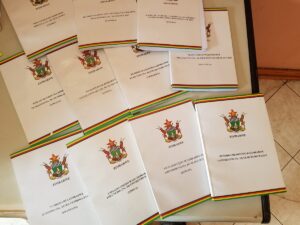
By Shamiso Saburi Dima –
The Zimbabwe Council of Churches in collaboration with Crisis Coalition Zimbabwe convened a dialogue in which the integrity of the country’s 2023’s constitution was questioned amid numerous amendments that have effected to it 11 years after its adoption.
As Zimbabwe’s 2013 constitution celebrated its 11th anniversary, a concerning reality emerged – the once-celebrated document has been repeatedly amended, undermining the very principles of democracy it was meant to uphold.
The signing of the 2013 constitution was a significant milestone for the country, ushering in a new era of democratic progress. However, over the past 11 years, these amendments, often driven by political interests, have raised alarm bells among Zimbabwean citizens.
Dr. Tinashe Gumbo, speaking on the role of the Church in the constitutional-making process, highlighted the Church’s involvement since 1964. He referenced the 2006 ‘Zimbabwe We Want’ document, which informed the current constitution and advocated for a shared national vision, political tolerance, and a homegrown constitution. Despite these efforts, Dr Gumbo expressed disappointment in the lack of progress.
“The Church played a significant role in the development of the constitution. Documents like “The Zimbabwe We Want” informed some sections of the constitution in the hope of attaining a peaceful democratic society. Unfortunately, it has been a journey of so many promises yet little has been achieved, said Dr Gumbo.
The ZCC General Secretary, Rev. Wilfred Dimingu, affirmed the Church’s continued involvement, stating that it has mobilized the public and remains the voice of the voiceless. He called for other civic organizations to join the effort to defend the constitution.
“The Church has continued to play its role through mobilizing the public to attend hearings. The Church will continue to be the voice of the voiceless and continue to influence the law-making process. We need other civic organizations to come on board,” he said.
Citizens acknowledged the capacity of the Church and civil society organizations to mobilize grassroots communities and promote constitutionalism and democratic principles. However, they also cited the deterioration of socio-economic rights and the shrinking of the democratic space, which they attributed to a lack of political will to implement the constitution.
The continuous amendment of the constitution before the implementation of other clauses is seen as reducing the value of the document that was approved by citizens in 2013. Concerns were also raised about the centralization of power in the hands of the President, leading to an authoritarian style of government, and the failure to uphold the constitutional provision for the devolution of governmental powers, contributing to the collapse of social service delivery.
As Zimbabwe’s constitution faces a critical juncture, the nation’s citizens call for a renewed commitment to the principles of democracy, transparency, and the rule of law.


